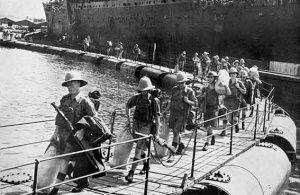We left Capetown to make our way round the Cape of Good Hope, where we understood that we would put in to Durban. We then hit a storm of violent intensity. Conditions below decks were indescribable. I have a fond memory of asking one of my unit if I could get him anything, as he was absolutely prostrate with sea-sickness. “Yes,” he whispered, “Get me an undertaker!” The storm abated and we duly arrived in Durban. This time my luck changed. I was one of a group to be granted shore leave.
Durban seemed to be full of turbanned Indians, and I and my friends repaired to the nearest hotel restaurant only to be told by a Sikh waiter that it was reserved for ‘Officers’ and that we should try the dockside cafes. This we did, and found them quite satisfactory. I can remember very little of Durban except that I was impressed by the wide boulevards and by a signpost which gave not only the distances to Nairobi and Cairo but to London and New York. The ‘Empress of Asia” was a coal-burning ship and the stokehold crew felt that they had had enough by this time and decided to desert. However, it was not to hinder our progress as soldiers were drafted to work as stokers, and to see the ship up the east coast of Africa and through the Red Sea to Suez. Again my luck was in – I had to undertake signalling duties, which was certainly better than stoking a ship in the temperatures we had encountered. We eventually docked in Suez after a total voyage lasting more than three months.

Troops disembarking at Suez
We were quickly disembarked and bussed to one of the many military camps in the Delta area. As newcomers we found it difficult to adjust. We lived in tents without mosquito netting until an officer noticed our miserable condition, and we also learned a few essential words of Arabic. Otherwise our life seemed to consist of kit inspections and parades for foot drill and medical inspections. No one was allowed off the camp site, and in any case there was literally nowhere to go. As there were numbers of Australians in the camp we were able to note with interest how much better their lives seemed to be. They were well-paid, on friendly terms with their officers, and not subject to the irritating and petty restrictions which we suffered. We had to wear solar topees, even to go to the canteen, and these, together with our knee-length shorts, stockings and puttees, were the subject of much ribald comment from our colonial comrades.
Eventually our Division was ordered to move, and to our delight the move came to be to Cyprus rather than “up the desert’. We were embarked on several vessels in Alexandria harbour, and we set off to enhance further our reputation as the 50th Sight Seeing Division.
Our ship was the ‘Leander”, a cruiser of the New Zealand navy. The sailors obviously resented these crude and dirty British soldiers invading their beautifully maintained vessel, and when we arrived off Cyprus they took their ‘revenge’. The “Leander” was too big to get in to Famagusta harbour so we had to be transferred to the destroyer “Jaguar”. This was done at night, and as the crew of the “Leander” had to throw our kitbags from one vessel to the other they took some delight in flinging quite a number into the sea from where they were recovered, but with the contents very wet. “Jaguar” approached the shore, and we were then put into the ship’s boats which grounded us on the beach. We were ordered to dig in and wait for the dawn. The immediate future of Cyprus was uncertain because the Germans had used paratroops to take Crete and intelligence was such that nobody seemed to know if Cyprus was to suffer a similar fate. Fortunately it was a fine night. We were forbidden to smoke, speak or sleep, and the hours went very slowly. We ‘stood to’ as dawn broke, and to our intense amusement and delight the only ‘invader’ to be seen was a Cypriot with a tray of cigarettes and sweets which he was offering for sale from the parapets of the trenches we had dug.
We quickly moved inland and set up our tents in an orchard just outside Nicosia. We were invited to give these tents suitable names and put up signs so that we could easily be identified. We were put in groups of six for this purpose, but our name, “The Kremlin”, was not considered suitable, even though the Russians were now our allies. As we were mostly Geordies we compromised with ‘Wor Hoose’ (Our House).
I suppose the next few months were one of the most enjoyable periods of the war. The weather was good, and as the threat to Cyprus receded we were able to see quite a bit of the island.